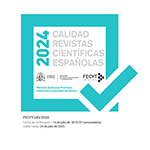The risk of radicalization among young inmigrants. Guidelines for its prevention from social intervention.
Abstract
The phenomenon of extremist radicalization is a constantly fluctuating reality and a concern for our societies, driving numerous studies concerning the circumstances of groups of minors in vulnerable environments, such as young immigrants, who are exposed to real risks of recruitment. The aim of this paper was to use a Delphi study to develop a better understanding of how these young people are radicalized. Thirteen panelists participated, selected in a discretionary manner from professional experts in social intervention with young immigrants and academics and researchers recognized as leading experts in radicalization processes. Using the VERA-2 tool, the experts expressed their degree of agreement regarding the significance and presence of factors associated with the radicalization process in young immigrants, in terms of both opinion and action. In general, the results showed higher levels of agreement regarding the significance for radicalization of the presence of attitudinal factors among this group of young people, such as hate, frustration, rejection of society and its values, collective identity problems and perception of injustice. These factors were identified as more influential when young people first have contact with the extremist world, again in terms of radicalizing both opinion and action. They were considered capable of acting as clear indicators for the detection of possible recruitment processes. The results can offer new guidance in terms of practices and policies that can support the prevention of violent extremism among young immigrants.
Downloads
Article download
License
In order to support the global exchange of knowledge, the journal Cuadernos de Trabajo Social is allowing unrestricted access to its content as from its publication in this electronic edition, and as such it is an open-access journal. The originals published in this journal are the property of the Complutense University of Madrid and any reproduction thereof in full or in part must cite the source. All content is distributed under a Creative Commons Attribution 4.0 use and distribution licence (CC BY 4.0). This circumstance must be expressly stated in these terms where necessary. You can view the summary and the complete legal text of the licence.









